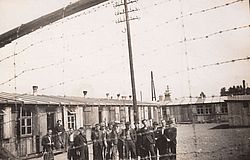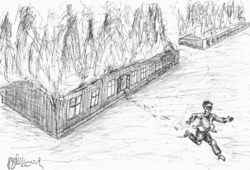Nothing to celebrate after work
The living conditions of forced labour
The daily lives of the forced laborers were hard. Regulations also determined everyday life outside of work. Their origin determined the type of accommodation, the degree of freedom of movement and the amount of food rations. Those who worked as farm workers or servants were usually accommodated directly with the employer. Provisional camps were often available for all other forced laborers. Some Western Europeans even found accommodation in private quarters. People from Poland and the Soviet Union, on the other hand, had to live in guarded camps.
There was usually a lack of sanitary facilities. Hunger, exhaustion and poor working conditions caused many forced laborers to fall ill. Despite everything, there was hardly any health care available. The arbitrariness and abuse of power of the camp leaders and guards also threatened the lives and health of the forced laborers.
Women were particularly exposed to this. Often they became victims of sexual violence. Employment offices and doctors forced pregnant women from Eastern Europe to have abortions. Their offspring were considered "racially undesirable". If forced labourers nevertheless had children, they did so under the most adverse conditions. After the birth, the women were generally deprived of their children. The children were sent to so-called "foreign child care centres", where they died of starvation or illness.


